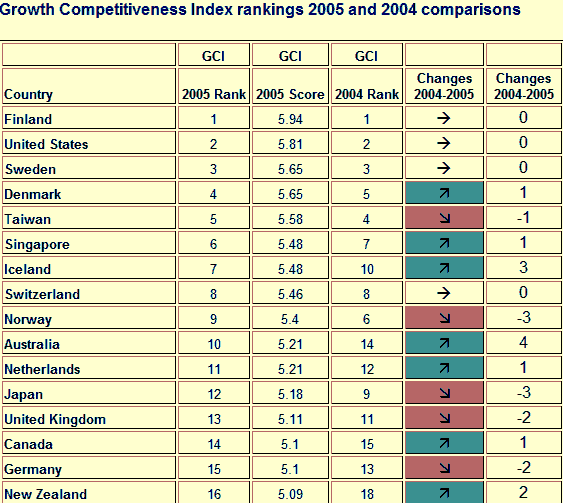|
News & Views item - October 2005 |
On
the World Economic Forum's Rankings of National Competitiveness Australia Has
Climbed 4 Places to Reach 10th. (October 9, 2005)
The September 28 media release reads, "Nordic countries and East Asian tigers top the rankings in the World Economic Forum's 2005 competitiveness rankings. Australia, India, Ireland and Poland all gain positions – US remains in second place after Finland.

The report analyses 117 nations and according to Augusto Lopez-Claros, Chief Economist and Director of the World Economic Forum’s Global Competitiveness Program,
The Nordic countries share a number of characteristics that make them extremely competitive, such as very healthy macroeconomic environments and public institutions that are highly transparent and efficient, with general agreement within society on the spending priorities to be met in the government budget. While the business communities in the Nordic countries point to high tax rates as a potential problem area, there is no evidence that these are adversely affecting the ability of these countries to compete effectively in world markets, or to provide to their respective populations some of the highest standards of living in the world. Indeed, the high levels of government tax revenue have delivered world-class educational establishments, an extensive safety net, and a highly motivated and skilled labour force.
Were we to accept Lopez-Claros' assessments the approach of Australia's governing Coalition to move budget surpluses into tax cuts for the upper middle income and wealthy segments of the Australian population is not only unnecessary but counter production as to the future of the nation's economic competitiveness.
On the other hand the squeezing of the basic and strategic public research areas together with the increasingly venomous attacks on the universities with its consequent demoralisation of staff appear ideologically motivated and are certainly counter productive.
But that said, the report summarised Australia's position as, "Australia, in 10th place, has moved up 4 places since last year, with improvements across many of the institutional and technology indicators measured by the index. The country has world-class public institutions, sound public finances and very low levels of corruption in the economy. And Australia’s companies are measured as being very innovative, while harnessing new information and communications technologies extremely well."